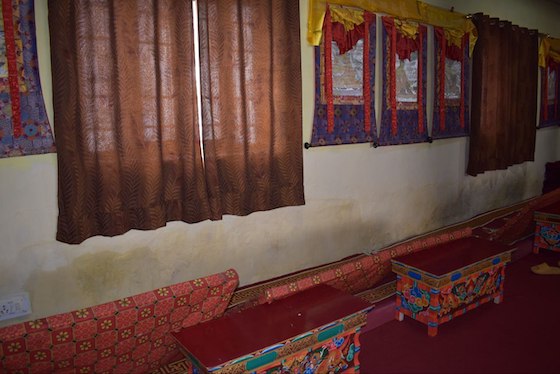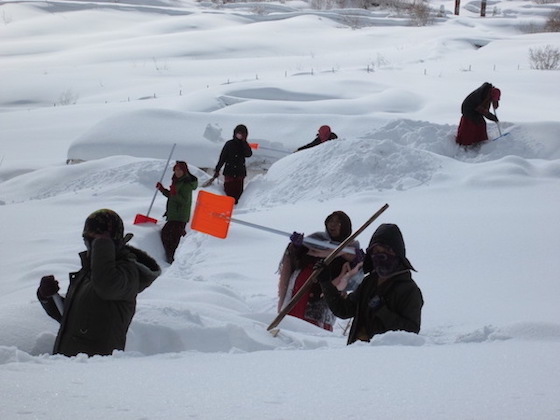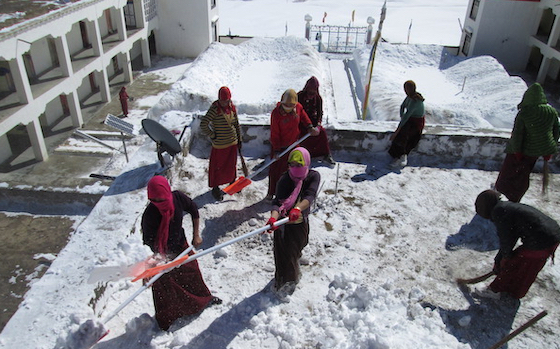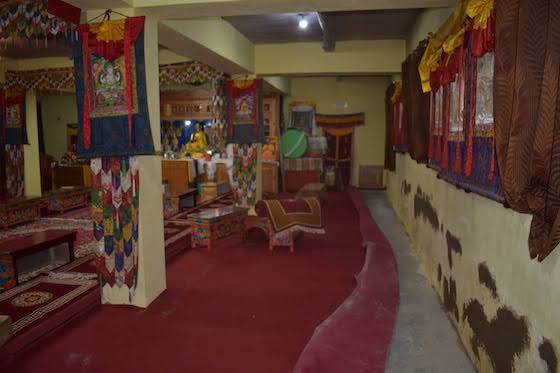Thanks to generous donors, this project is now fully funded. We are so grateful and will report back with news and photos as soon as possible. See our Current Needs here.
The nuns at Sherab Choeling Nunnery need your help urgently. They want to insulate their ground floor to guard against cold and mold. The nunnery is bitterly cold in the winter and the dampness in the walls is a serious health hazard.
The cold and damp conditions are really taking a toll on their health. Several nuns are struggling with joint pain, back pain, and knee problems. Right now, five nuns are especially affected. It’s hard for them to carry out their daily responsibilities like mess duty, attending classes, and prayers.

Damp, moldy walls in the prayer hall at Sherab Choeling Nunnery. Please help protect the nuns from cold and mold!
Sherab Choeling, home to about 73 nuns, all from local villages, is in the high-altitude Spiti Valley of Himachal Pradesh, northern India. Spiti is a cold desert mountain valley located high in the Himalayas. The name “Spiti” means “the middle land” — the land between Tibet and India.
Winters are very tough at Sherab Choeling, with temperatures ranging from 23°F to -4°F, sometimes dropping below -22°F at night. The equivalent temperatures in Celsius are -5°C to -30°C. Heavy snowfall from December to February blankets the valley. Clear, sunny days are common, but biting winds make it feel even colder.

Head nun, Ani Budith la, shows the state of her room at the nunnery. Like the other 24 rooms, it suffers from visible mold, peeling walls, and harsh cold during winter.
The nunnery is at about 12,500 feet or 3,800 meters altitude and can be cut off in winter. When the nuns come down for the annual Jang Gonchoe inter-nunnery debate, they often can’t return to Spiti right away. In 2024, for example, they had to stay in Hamidpur for five to six months because of road closures and the extreme cold.
The nuns would like to insulate the ground-floor rooms with wood panelling. The outside walls are made of cold mud and cement and are damp and very difficult to keep warm. Wood panelling is used in these regions to insulate buildings and make them warmer and more comfortable.

Nuns shovelling a path around the nunnery. The severe winter conditions at the nunnery are impacting the nuns’ health and well-being, and we need your help to insulate the ground-floor rooms.
To improve the lives of the nuns, we would like to insulate the ground-floor bedrooms, classrooms, prayer hall, and library.
Total budget: $37,200
Please help insulate Sherab Nunnery to protect the nuns from cold and mold!
To help you can:
- Make a gift online
- Call our office in Seattle, U.S. at 1-206-652-890
- Mail a check to The Tibetan Nuns Project, 815 Seattle Boulevard South #418, Seattle, WA 98134 U.S. (Please note that it is for the Protect Nuns From Cold and Mold project.)
- Donate securities
- Leave a gift in your will to the Tibetan Nuns Project
About Sherab Choeling Nunnery
Sherab Choeling Nunnery in the Spiti Valley of Himachal Pradesh was founded in 1995 with the vision to educate Himalayan Buddhist nuns who would otherwise have no opportunity to receive any formal schooling or spiritual education. It is a non-sectarian nunnery that recognizes the beauty and value in all Buddhist traditions.
Typically, women who live in remote areas like Spiti and who are interested in studying or practicing their religion have very few options. The Tibetan Nuns Project was approached by the nunnery in 2006 to help them develop their institution and we accepted them into our sponsorship program.

Nuns clearing deep snow off the roof of the nunnery. The cold and damp at Sherab Choeling are having a severe impact on the health of the nuns.
There are currently 73 nuns at Sherab Choeling Nunnery. They follow a 17-year study program which includes Buddhist Philosophy, Tibetan, Hindi, and English. The broad education is intended to provide the nuns with the necessary skills to educate future generations of nuns and the communities from which they come.
These classes help them get ready for the Geshema degree. The nuns actively participate in debates and take part in the annual Inter-nunnery Jang Gonchoe debate session. The nunnery has farmland, so the nuns work hard to till, sow, and harvest.

This photo shows the nuns’ damp and cold prayer hall. Wooden panelling is urgently needed to help retain heat and reduce moisture, improving both comfort and health for the Sherab Choeling nuns.
Tibetan Nuns Project sponsors help pay for the nuns’ food, daily needs, education, and medical needs. But the nunnery is very uncomfortable during the winter, and the nuns need your help to insulate the ground floor.

